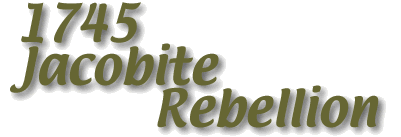|
All Highland men between
the ages of 14 and 60 (roughly) should make themselves available to serve
their Chiefs in time of war. Accordingly, these men should be prepared
to arm themselves as to their station. The men in Highland Clan regiments
fell basically into three groups:
The front line men were obviously in the front
ranks. These men were at the top end of the Clan structure. They would
be the best armed, best dressed, and best trained. They were expected
to act as shock troops and break the enemy line. Front line men would
carry long guns, pistols, dirks, short blades, daggers, bayonets, targes
and a sword (often a basket hilt.)
Middlemen were less highly trained and would be
armed with only part of the previous list. Middlemen were not likely to
have broadswords or pistols.
The tenants and herders came last. These men seldom
had coats or shoes, and were often armed with ancient guns, broken swords,
pitchforks, scythes, or Lochaber axes.
Clan battle lines should be drawn up based upon dress and accouterment.
Some trading/loaning of arms and equipment may be necessary to accomplish
this.
Many men at Culloden did not have basket hilt swords. There is no record
of great two handed swords, Viking war hammers, troll axes, or sling shots
on the battlefield at Culloden. Sharp farm implements were seen in the
rear ranks, but not golf clubs or medieval weapons.
Do not wear a “sgain dubh” or so called “black knife”
in your stocking. It is inappropriate for the Eighteenth Century.
At our battle re-enactments we are limited to using wooden swords and
other similar safety-oriented items. We can obviously only shoot blanks
in our flintlocks and cannons. In hand-to-hand combat situations no real
edged weapons may be used on the battlefield. Edged weapons may be carried,
or displayed in camp. Appropriate pistols may be carried, but not fired.
Long guns are limited to those from before 1775 (approximately.) These
should be reproduction smooth bored flintlocks (a limited number of matchlocks
or wheel locks may be used.) The use of bayonets is also restricted.
No antique weapons may be fired. Blank rounds and priming must be done
from pre-rolled paper cartridges. The maximum amount of powder grains
is 1.5 x caliber. You may not load from powder horns or any other conveyance.
At no time is anything but powder to go down the barrel. Ram rods may
not be used, not even to ram the paper. There will be safety checks before
each battle. Please consult with your unit if you have questions about
flintlock weapons, safety, or requirements. This event adheres to the
appropriate safety standards of organizations like the N.W.T.A .or the
B.A.R., and we err on the side of caution.
You do not need a gun to participate. Many Jacobite men at Culloden were
without guns.
You may make your own wooden sword and targe, modeled upon an appropriate
original. They are also usually available for purchase at the event. Please
remember, even wooden swords can hurt people. All hand-to-hand combat
must be choreographed in advance. Men who do not practice at the morning
session may not participate in hand-to-hand combat during the battle re-enactments.
|

